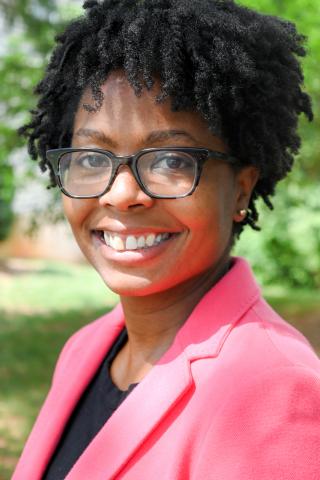Kimalee Dickerson Researches How Women of Color Experience Working in Government
School of Government faculty member Kimalee Dickerson is in the beginning stages of a qualitative research project examining the experiences of women of color—particularly Black women—working in local and state government in North Carolina.
Below, she answers questions about the inspiration behind her research, some early findings from its analysis, and where she will share the results.
Dickerson joined the School of Government in September 2021. Her teaching, research, and advising focus on diversity, equity, and inclusion (DEI) in the public sector.
What inspired you to begin researching the experiences of women of color in state and local government?
There were two main drivers for this research project. The first was getting to know the women who were part of the existing Engaging Women of Color (EWC) group. To provide a little back story, the School of Government offered a series of one-day conferences for women of color a few years ago. After the most recent conference, several women wanted to stay connected, and they formed a group. In my first conversation with the group, they mentioned wanting to share their experiences and stories. As a mixed methods and qualitative researcher, I thought, “this sounds like a research project.”
I also did some research about women of color—particularly Black women—working in public administration. What I found was that the intersection of race and gender had not been studied that often in the field of public administration and how that intersection influences women’s experiences. That was the second driver for me—realizing this is something that could be valuable in terms of the contribution to the field and to practitioners.
Can you describe the process of how you collected and—subsequently analyzed—the data?
I collected data through focus groups. Early in the research process, I reached out to the EWC group and asked for their input in terms of relevant topics and questions. The group was an active partner in designing the research project, and they helped me recruit for the study by inviting colleagues and other women working in government to participate. Ultimately, 38 women from across the state who identified as African American or Black participated in focus groups in November 2022. I asked them about a range of topics including their career paths, what motivates them to join and stay in government, and supports and challenges in the workplace.
I have done some initial analysis of the transcripts for themes, meaning patterns across the interviews, and I am starting to dive in deeper.
The research project is still in its early stages—but can you share more about some of the themes and experiences you have identified among women of color working in local government?
There are many interesting themes, but one that stands out to me relates to what it means to be a Black woman working in government. In the words of one interviewee, “it means opportunity and it also means some opposition.” In terms of opportunity, the women I interviewed emphasized the importance of representing and being a voice for historically excluded communities. Several interviewees were the first Black woman in their position, and many felt a responsibility to be a role model, particularly for younger women who may also want to work in government one day.
On the other hand, the interviewees described some opposition from colleagues and the community. Opposition came in different forms including being doubted, overlooked, or misunderstood and feeling pressure to be perfect or prove they deserved to be there. Several women talked about the stress from this dual pressure of opportunity and opposition, and a few even talked about how the stress impacted their health.
In March, I shared the findings about opportunity and opposition at the Conference of Minority Public Administrators (COMPA).
Can you share what attendees can expect to learn at the upcoming Engaging Women of Color conference?
I am very excited to bring this program back to the School of Government. This year’s EWC one-day conference will be held on Friday, June 2nd, and the topic is “Caring for Ourselves and Our Communities.” The themes from the focus groups of stress and physical/mental health were one of the motivations to focus on wellbeing. Attendees can expect to learn a variety of self-care strategies.
Another goal of the conference is to provide space to grow the community and connection that the women of the EWC group have created. The EWC group welcomed me into their space, and it is important to me to continue to support them through the School of Government.
What are the next stages of your research process and where/when can we expect to see it appear?
I’m excited to dive deeper into the data. The themes around opportunity and opposition were just scratching the surface, and there is a lot more in terms of other experiences, themes, and topics that I want to share from this research.
I will have a chapter in the upcoming book, Women of Color and Hair Bias in the Work Environment (IGI Global, forthcoming in 2024). I will be working on that over the summer and the book should come out soon after. I did not specifically ask about hair in the focus groups, though the topic came up in relation to being authentic in the workplace and showing up as your full self. As I continue to analyze the data, I look forward to sharing the findings from this research with both academic and practitioner audiences.
What are you most looking forward to about releasing this research?
I am most excited about the opportunity to highlight the experiences of the women who participated in this study. My hope is that sharing this research will help create more inclusive government workplaces.
Published May 5, 2023



